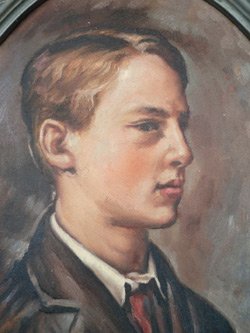Category Archive 'The Gentleman'
19 Dec 2016


Michael Fane, the hero of Compton Mackenzie’s bildungsroman Sinister Street describes the idea of the gentleman.
“Every day more and more loudly the opinion goes up thar these gentlemen are accidental ornaments, rather useless, rather irritating ornaments of contemporary society. Every day brings another sneer at public schools and universities. Every new writer who commands any attention drags out the old idol of the Noble Savage and invites us to worship him. Only now the Noble Savage has been out into corduroy trousers [Update this to “blue jeans.” –JDZ]. My theory is that a gentleman leavens the great popular mass of humanity, and however superficially useless he seems, his existence is a pledge of the immanence of the idea. Popular education has fired thousands to prove themselves not gentlemen in the present meaning of the term, but something much finer than any gentleman we know anything about. And they are not, they simply and solidly are not. The first instinct of the gentleman is respect for the past with all it connotes of art and religion and thought. The first instinct of the educated unfit is to hate and destroy the past. Now I maintain that the average gentleman, whatever situation he is called upon to face, will deal with it more effectively than these noble savages who have been armed with weapons they don’t know how to ue and are therefore so much the more dangerous, since every weapon to the primitive mind is a weapon of offense.”
————————————
Meanwhile, today, at the same Oxford Michael Fane once attended, the noble savages, now called Social Justice Warriors, are in full and open revolt against, not only the Past, but against Nature itself.
Daily Mail:
Oxford University has told colleges and academic departments to remove gender-specific titles such as Mr and Mrs from their websites and leaflets.
The guidance, contained in a document from the Equality and Diversity Unit, suggests only academic terms like Dr and Prof should be retained.
It advised that while the process of removing gender-specific titles is underway, people should be given the option of appearing without any prefix. …
Gay rights campaigner Peter Tatchell supported the University’s stance on gender specific titles.
He told MailOnline: ‘A person’s name is usually sufficient to identify their gender if an identification is required for some good, practical reason.
The guidance suggests only academic terms like Dr and Prof should be retained.
‘It is a positive thing to not always emphasise gender. We are all human. Why does our gender matter so much and why should it be constantly highlighted by titles?
‘In an age when more people are defining themselves as transgender or gender-fluid, using gender-based titles ignores the new reality and could cause needless offence.’
The cultural legacy of 1968 has turned every elite university, on both sides of the Atlantic, into a lunatic asylum.
20 Nov 2013


Lucius Cary, 2nd Viscount Falkland (c. 1610 – 20 September 1643)
Jeffrey Hart, in the New Criterion, remembers the now-approximately-extinct ideal of the English, and the later American, Gentleman, as embodied in the lives and characters of Lucius Cary, 2nd Viscount Falkland, Princeton’s Hobey Baker, and the Post-WWII “wise men” of American Liberalism: Dean Acheson, Charles “Chip†Bohlen, John J. McCloy, George Kennan, and Averell Harriman.
On the morning of September 20, 1643, Lucius Cary, Viscount Falkland, died at age thirty-three in cavalry action before the town of Newbury. A scholar and poet, an intimate of Ben Jonson, Thomas Hobbes, John Selden, Clarendon, and Davenant, he em�bodied in many ways the ideal of his period. His was not an absolutely first-rate mind, like those of Hobbes or Selden. They were, to put it one way, too surpassingly intelligent to be representative of anything. But Falkland did embody an ideal. He was an English gentleman as his era understood the idea. He was a man of great moderation, and in the House of Commons he often supported the reformers. He distrusted the power and arrogance of men like Bishop Laud. He had a broad definition of the Church of England, and held to reason and religious toleration. But he grew increasingly frightened by men like Cromwell, Hampden, and Pym. When revolution and civil war loomed imminent, Falkland stood with the King as advisor and cavalry officer.
His superlative personal qualities grew in his own eyes increasingly irrelevant to the history that unfolded before him. The air of England reeked of cannon smoke, and her soil was drenched in blood. The King was duplicitous and a victim of bad advice. The long afternoons of discourse at Great Tew, the Falkland family estate in Oxfordshire, might as well have been on another planet. Falkland’s philosophical and platonic friend Lady Sophia Murray was imprisoned in London as a spy and traitor, involved by Falkland himself in a feckless plot. She died of consumption on the same day—legend says the same hour—that Falkland in effect committed suicide on the field of battle.
For months Falkland had been sunk in melancholy, and had become uncharacteris�tically careless about his dress. On the morn�ing before the battle, however, he called for fresh linen, took communion, declared that he would be “out of it ere night,†and took his place on the right wing of the King’s line of cavalry.
The King’s infantry were finding it im�possible to force their way past a hedgerow manned by Essex’s Parliamentary musketeers. The only way through was a narrow opening in the hedge, a bottleneck of slaughtered royalists. Suddenly Falkland and his horse sprang forward and plunged toward the gap. Before he reached it, he was mortally wounded in the stomach. A few minutes later, the rest of the King’s cavalry plunged through the gap, widening it, and routing Essex’s musketmen. Falkland was buried in a small church at Great Tew.
Falkland exemplified one phase of the idea of the English gentleman, an idea which has remote classical and Christian roots but which can be discerned early in Chaucer’s “verray parfit gentil knicht†and later in such Renaissance works as Castiglione’s The Courtier and its English counterpart, Sir Thomas Elyot’s The Governour, and, of course, in the legend of Sir Philip Sidney. The idea undergoes a chilling formulation in Lord Chesterfield’s conduct-manual letters to his illegitimate son, and becomes broadened and more widely accessible in the Spectator essays of Addison and Steele. Gradually the idea takes on a distinctively English character, different from anything on the Continent. In the late eighteenth cen�tury, the idea importantly incorporates the idea of sports: riding to hounds, cricket, boxing, rugby. Dr. Thomas Arnold reformed the school at Rugby in order to produce Christian gentlemen; his son Matthew Ar�nold celebrated the idea in a little-known essay entitled “An Eton Boy,†about Arthur Clynton Baskerville Mynors, who died during the campaign against the Zulus. “We see him,†writes Arnold, “full of natural affection, and not ashamed of manifesting it; bred in habits of religion, and not ashamed of retaining them; without a speck of affectation, without a shadow of pretension, unsullied, brave, true, kind, respectful, grateful, uncensorious, uncomplaining; in the time to act, cheerfully active; in the time to suffer, cheerfully enduring.†The British scholar Philip Mason, in The English Gen�tleman: The Rise and Fall of an Ideal (Mor�row, 1982), provides a very rich account of the development of the ideal.
I believe it can be argued that the idea of the gentleman, modified in its American con�text, but certainly derived from the British model and not at all from anything on the Continent, and involving matters of style and conduct comparable to the British model, has been since the eighteenth century the only persisting social ideal in American culture. Nothing has filled the gap left by its relatively recent disappearance.
Your are browsing
the Archives of Never Yet Melted in the 'The Gentleman' Category.
/div>

Feeds
|





